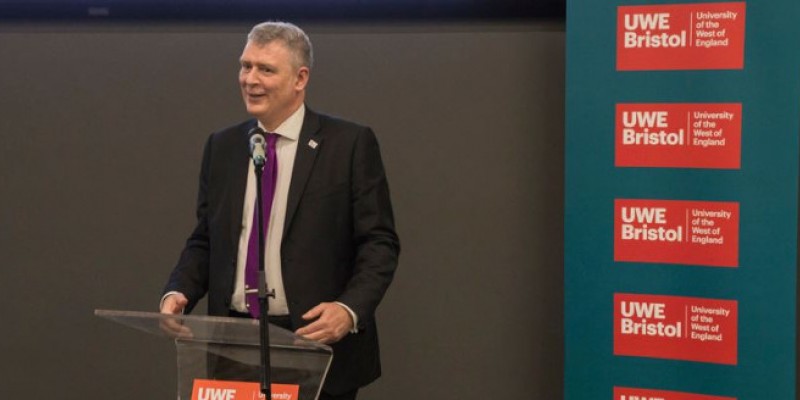
UWE, in partnership with Business West, runs an annual lecture series that brings top business leaders to Bristol. We caught up with Richard Gleave, COO at Public Health England, before he gave his address:
1. What is the one characteristic every leader should have?
One of the things that people look for in a leader is optimism; the ability to make sure you’ve got the enthusiasm to project a positive image of the future.
I think the research base for this is really good: optimists tend to make things happen, they enable things that otherwise wouldn’t be achieved and they bring people together to follow them, so optimism!
2. What inspires you?
The thing that’s inspired me for the last decade or so has been wanting to learn more about the evidence underpinning what I do.
It’s been one of those personal journeys that I’ve been on.
I spent a year in the States, which let me step out of my day job and reflect more about what I did. Understanding the evidence base is not necessarily all statistics that underpin it, but what the research has shown and how you put that research into practice.
3. What do you do to ensure you continue to grow as a leader?
I’m just starting a PhD, which is a big challenge for me.
It’s a PhD about the organisation I work in, and that’s going to reinvigorate me probably until the end of my career.
When I look at my colleagues – those who’ve got the energy and the drive – they’re always looking at new opportunities for learning.
4. What characteristics would you look for in a graduate employee?
With people who are graduates you’re looking for two qualities.
You’re looking for personal qualities – the ability to be flexible and to adapt.
But I’m also looking to make sure that they have some core basic skills.
In the work that we do, the ability for those who are analysts to do good analysis and the ability of people who do a lot of writing to construct an argument – those are good basic qualities and you can bring those from all sorts of different degrees.
5. What advice do you wish you had given yourself as you were leaving university?
Well, my dad gave me a bit of advice – he worked in teacher training college – he said you need to remember 70 percent of what you do in your job is boring.
On my first day we had a celebrity who’d fallen down the stairs at the hospital I began working at and we had journalists in white coats climbing up the fire escape to get in, and I phoned my dad at the end of the day and I said “dad, you’re wrong it’s all exciting!”
But I think there’s ups and downs and ebbs and flows. Some things are going to be tough and you are going to need to hold on in there, but there will be lots of times when it’s exciting as well.
6. How do you think the world will look in ten years’ time?
One of the big projects that I’m doing is about creating the new Public Health Science Centre that we’ve got permission from the Government to build.
We’re looking a lot at different ways in which people will work in ten years’ time. There’s lots around the flexibility of working – the breakdown of the conventional 9-5 day, people working different hours, much more homeworking.
But we’re going to have some core functions like laboratories where you have to work in that environment and at particular times. So flexibility is increasing, but we need to remember that not everyone is going to get that opportunity for flexibility, so we need to create a system that seems fair to those people, because they might start to feel disadvantaged.
I think the world of work will look very different.
7. What kind of employee do you think you’ll need by then?
We will definitely need people that have some good expertise in science and the skills that are associated with that.
I think we recognise more and more as an employer that we need to help people to develop into the very specialist roles that we need, to work in our most specialist laboratories.
You might have a PhD, but you’re going to need to have five years’ of specialist training with us in order to meet that particular need.
What we’re looking for is more of a mental attitude towards continuing to grow and develop, being flexible and adaptable to the way the world changes and the new demands that come forward.
This series of free public lectures brings top level business leaders to Bristol. You can discuss these events on Twitter using the hashtag #BristolLectures and view further content from Richard Gleave’s lecture here. For more information please contact events@uwe.ac.uk.
- Log in to post comments
